Mastering your snare strokes and tom hits is a must when practicing the drums, but doing so can be a noisy process. To keep your beat from disturbing the whole house (or neighborhood), you’ll want to consider installing a sound-absorbing floor. But which flooring types are best for a drum room?
A drum room should feature flooring supported by a thick underlayment. 7 best flooring types for a drum room are:
- Plush carpet
- Floating wood panels
- Cork slabs
- Rubber sheets
- Wood plastic composite (WPC)
- Vinyl composition tile (VCT)
- Ethylene-vinyl acetate (EVA) foam squares
Keep reading as I discuss the best floor materials and types to keep your drum room acoustically secure. That way, you can jam out on your kit without worrying about waking your household or aggravating your next-door neighbors.
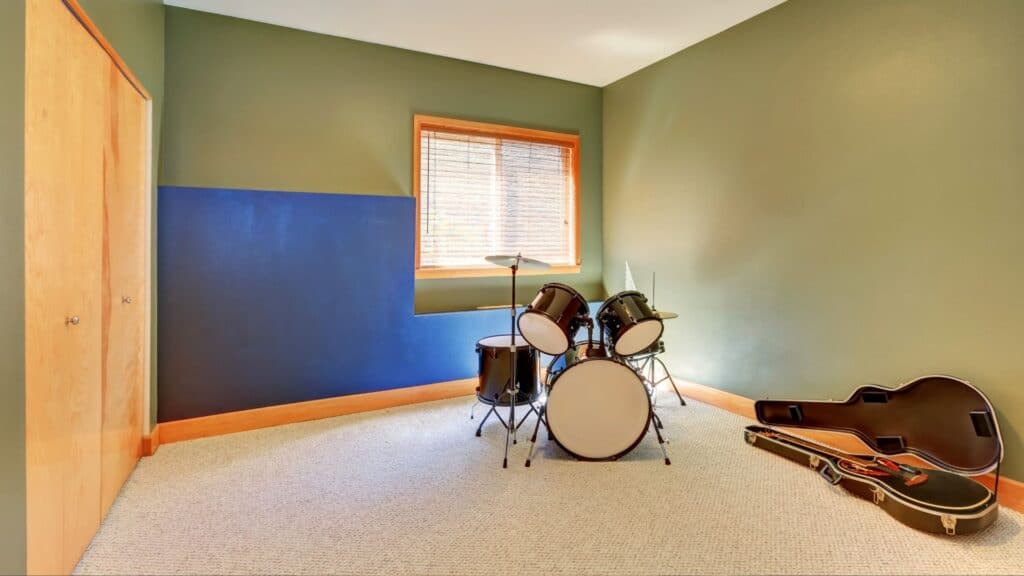
Plush Carpet
Carpet could be the best way to isolate the sound inside a drum room. After all, unlike tile, metal, or stone flooring, fabric tends to muffle sounds rather than amplify them. That’s because fabrics don’t vibrate as quickly or powerfully as other, more rigid materials.
Notably, the thicker the material, the more likely it will absorb sound. As such, carpets for drum rooms tend to be plush, high-fiber rugs with dense foam underlayments. Drummers can also add a few flat, low-pile rugs onto this type of carpeting to enhance its sound-absorbing qualities.
Still, thick carpet is almost always pricier than low-pile options. And dense, sound-muffling flooring underlayment isn’t nearly as inexpensive as thinner, lower-quality foams. When you add professional installation services to these initial costs, you have a relatively pricey flooring solution on your hands.
Therefore, plush carpet flooring might not be the best option for those living in a rental property. But it could be a worthwhile investment for experienced players that own their own homes.
However, carpets can be challenging to keep clean. Plush carpet is particularly notorious for holding onto loose bits of dirt and dust. If you own pets, live in a humid area, or tend to ignore your vacuuming responsibilities, a sleeker flooring material may be the better choice.
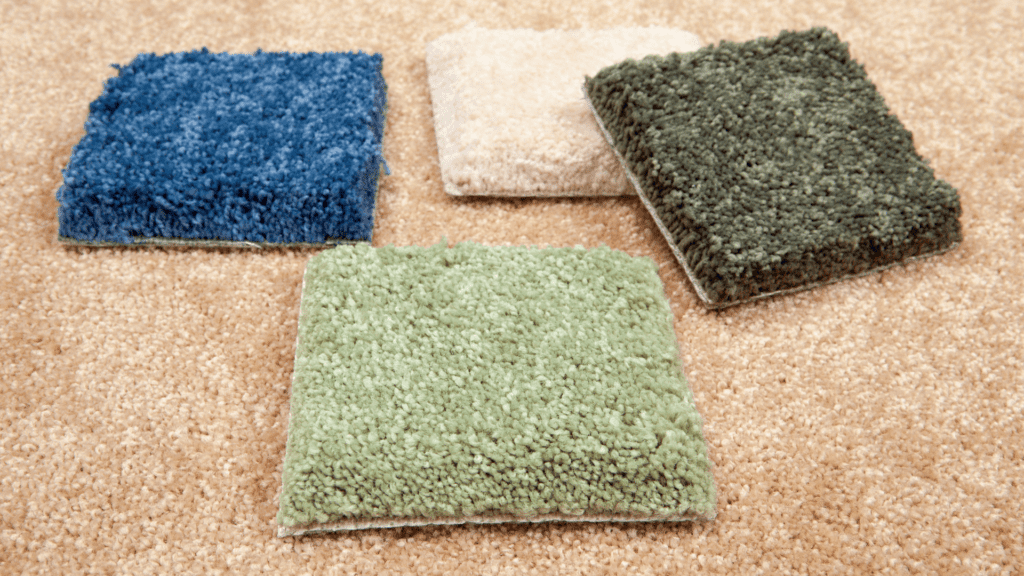
Advantages
- Thick fabric carpet absorbs sound more readily and effectively than many other materials.
- A carpeted floor is bound to feel comfortable on bare feet.
- Carpets come in a wide variety of styles and colors, ensuring that you’ll find something that matches your style.
Potential Drawbacks
- Plush carpet tends to be more expensive than other flooring types.
- A wet carpet can retain moisture and become a haven for mold.
- Keeping thick carpets clean is often challenging.
For more information, check out the 4 Best Flooring for Home Recording Studios.
Floating Wood Panels
Installing floating wood panels is another excellent way to soundproof your drum room while improving its interior acoustics. Generally, floating wood panels are the most aesthetically attractive and easy-to-clean option for drum rooms.
This flooring type utilizes a thick underlayment pad, just as with carpeting. Some types of floating wood floors are even installed directly on top of pre-existing carpet. This subfloor is crucial in diminishing any echo produced within the wood panels.
Many floating wood flooring is designed to snap into place. This makes installation relatively simple. That said, perfecting corners can be challenging for the average DIY home renovator. You might need to hire a flooring specialist to achieve a professional finish.
One of the valuable aspects of floating wood floors is that they muffle sounds while amplifying them. The wood material can resonate, creating a slight echo. But the underlayment beneath these panels quickly absorbs that echo, reducing noise transference to other areas.
Floating wood panels come in a wide variety of styles and wood types. You can choose from hardwoods, bamboo, or layered softwood materials. But while most floating wood flooring is comparatively affordable, hardwood options can quickly become expensive.
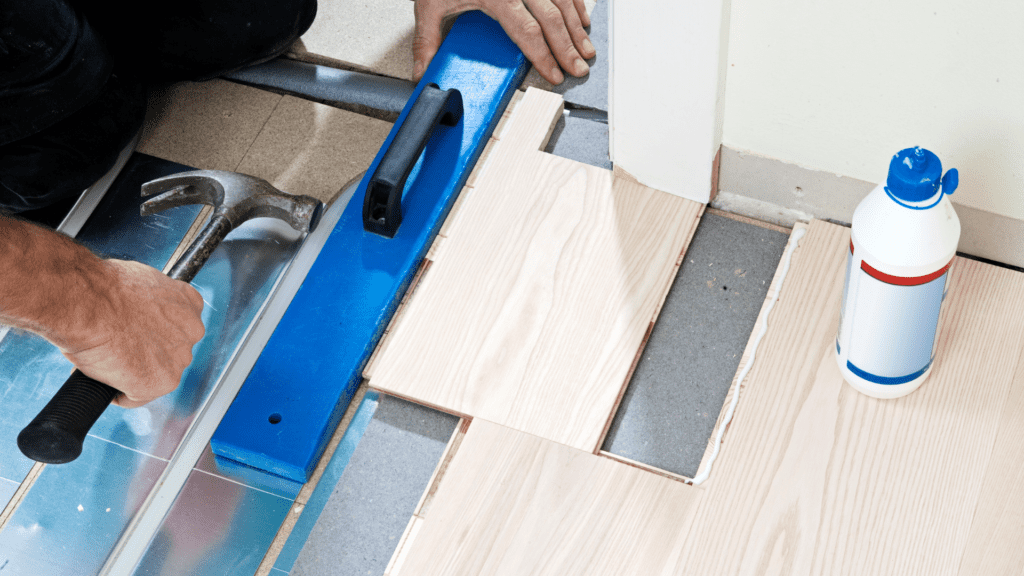
Advantages
- Floating flooring can be installed on various pre-existing materials, including carpets.
- The panels are often designed for easy installation and may snap together.
- The flat finished surface is easy to keep clean.
- Floating wood panels are far more rigid and supportive than carpet.
Potential Drawbacks
- Hardwood panels can get pricey, rivaling the cost of plush carpet flooring.
- This option may not be suitable for those renting their home or apartment.
For more information, check out my article:
- What Are Floating Floors And Are They Good?
- Are Epoxy Floors Any Good for Home Studios?
- 6 Cheap Recording Studio Flooring Options
Cork Slabs
Cork is a natural material that’s become a go-to eco-friendly flooring option for many homeowners. It’s often sold in large slabs or planks. And much like carpet, you can cut cork flooring to fit the dimensions of nearly any room.
Additionally, installing cork flooring is a straightforward process. But sound absorption is the primary reason why you’ll want to consider placing cork slabs on your drum room floor. After all, cork has a rigid structure that doesn’t tend to vibrate when exposed to sound waves.
This makes it an excellent soundproofing material for drummers. Not only can you outfit your drum room floors with thick cork slabs, but you can also install this material onto your room’s walls and ceiling.
Many cork flooring options are sealed and laminated, giving them a lustrous appearance and helping them repel moisture. However, it’s worth noting that thinner cork slabs and panels can be poor choices.
These may warp under the weight of heavier equipment and fail to insulate the room. Thicker cork flooring is a must. That said, this material can rival hardwood in terms of price.
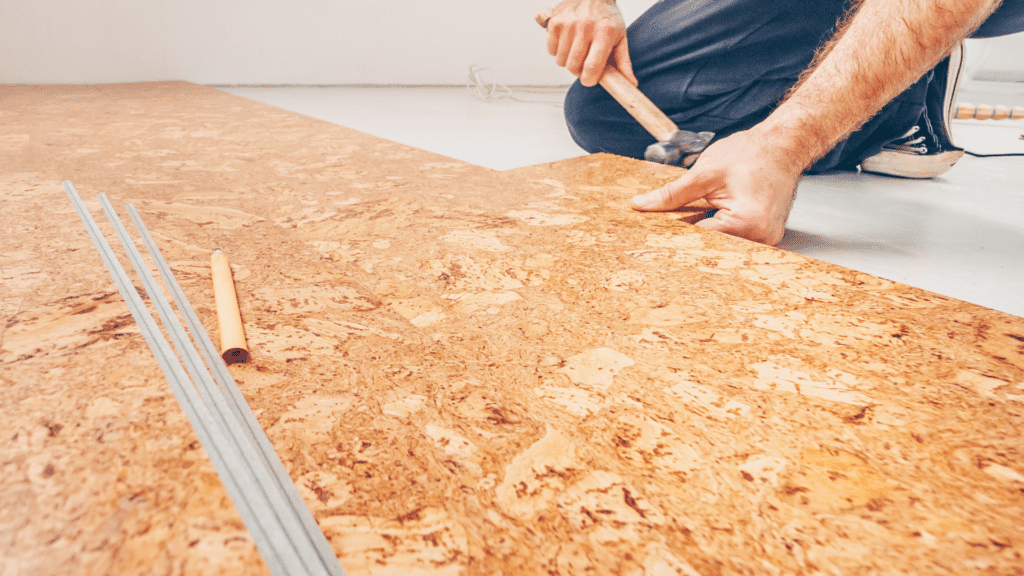
Advantages
- Most homeowners can install cork flooring without professional assistance.
- Sealed cork slabs are resistant to moisture, making them easy to clean.
- Cork has a rigid structure that doesn’t readily vibrate.
Potential Drawbacks
- Cork flooring can quickly degrade if exposed to a humid environment.
- Thinner cork slabs are prone to chipping or permanent compression.
Rubber Sheets
It may seem odd that rubber could be an ideal soundproofing material. After all, rubber is known for its flexibility and bounce. But thick rubber flooring tends to be rigid, supportive, and insulative.
Like many other flooring types included in this guide, it doesn’t produce potent vibrations when exposed to sound waves. Instead, it absorbs these waves. And unlike cork, thick rubber sheets won’t compress into a thin pancake if a heavy drum set is placed on them.
You can purchase rubber panels, sheets, or pre-cut squares. The best option for you depends on the size of your drum room. Naturally, smaller spaces work best with squares and panels, while larger areas lend themselves better to rolled sheets.
Because rubber flooring comes in so many styles and designs, installing it is a cinch. You might not even need to hire professional help! But this can be dangerously slippery, especially when wet. Many rubber sheets also go through an off-gassing period.
During this time, the flooring can emit strong chemical odors that may irritate a person’s eyes and nose. As such, some drummers may prefer to choose a relatively scent-free option instead.
Advantages
- Rubber flooring is one of the most rigid and durable options for drum rooms.
- This flooring type can support weight better than some cork options.
- Rubber sheets are available in a variety of sizes and styles.
- Installing rubber flooring is simple and often doesn’t require professional help.
Potential Drawbacks
- A rubber floor can be slippery when moist.
- Some drummers may not appreciate the chemical smell that rubber flooring emits.
Wood Plastic Composite (WPC)
Synthetic materials are often the most affordable options. However, some aren’t as capable of absorbing sound as wood plastic composite (WPC) flooring.
As the name of this flooring type might suggest, WPC panels are made of a combination of wood and plastic. Many options also contain cork. This trifecta of solid, non-vibrating materials makes WPC floors some of the best options for drum rooms.
Unlike natural materials, the bulk of WPC floors are waterproof. This may boost their overall lifespan, ensuring that you enjoy a soundproof drum room for a more extended period. But WPC panels often require strong and toxic adhesives to stay put.
This feature can be problematic for those with sensitive respiratory systems, young children, or curious pets. You may need to quarantine your drum room for several days or weeks after installing this type of flooring.
Additionally, while a WPC floor might look like hardwood, it doesn’t have the same durability or composition. You won’t be able to refinish a WPC floor. As such, it may not be the best long-term investment, especially for those looking to sell their home within the next several years.
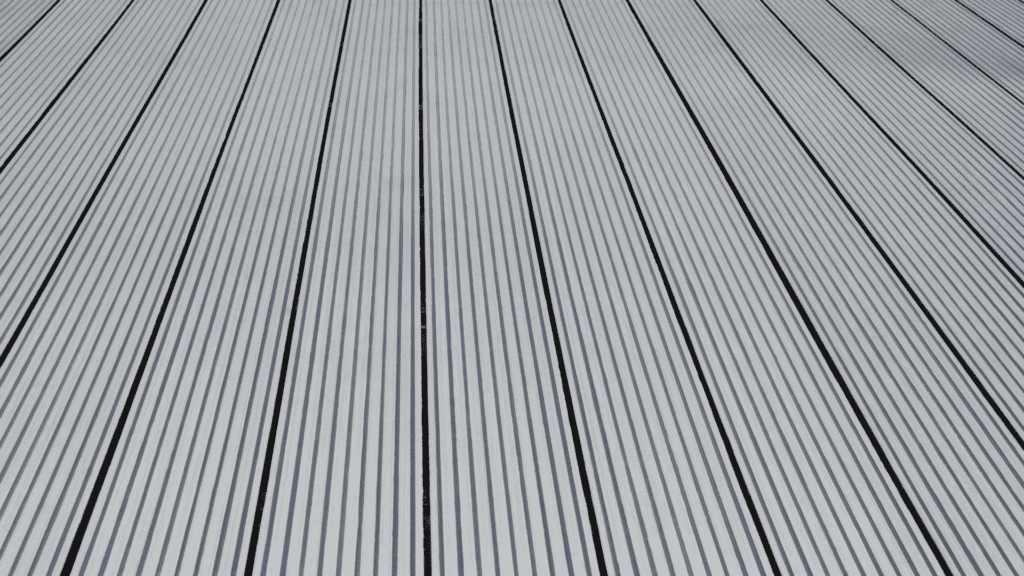
Advantages
- WPC flooring is one of the most affordable soundproofing flooring types for drum rooms.
- The synthetic blend of materials results in relatively waterproof flooring.
- This flooring utilizes wood, cork, and plastic to create a rigid and supportive material.
Potential Drawbacks
- You may need to use potentially toxic adhesives to install this flooring, which can pose a health risk to pets and small children.
- Unlike hardwood panels, you can’t refinish a WPC floor.
Vinyl Composition Tile (VCT)
Drummers looking to install an easy-to-maintain sound-absorbing flooring may want to choose vinyl composition tile (VCT). This flooring type is often found in commercial settings like hospitals and schools and often features a checkerboard style.
Unlike hardwood or plush carpet flooring, VCT is incredibly affordable. Consequently, it could be a worthwhile choice for drummers on a tight budget. But this wallet-friendly pricing comes with a couple of potential disadvantages.
Firstly, low-quality VCT flooring can emit health-threatening volatile organic compounds (VOCs). These are invisible contaminants that can linger in your home’s air, potentially causing a wide range of health conditions. Worryingly, some VOCs may be carcinogenic.
Another aspect to consider before choosing VCT flooring is permanence. Powerful adhesives are often used to install these tiles.
Unfortunately, replacing broken flooring or removing it entirely can be challenging at best. And while vinyl tiles can last for quite a while before showing signs of damage or decay, they’re not impervious to moisture or impacts.
Still, this synthetic material can block sound without emptying your wallet. If affordability is your top priority, you’ll want to consider it.
Advantages
- It’s a widely available and budget-friendly option.
- VCT flooring is exceptionally rigid, helping to reduce sound transference.
- It’s available in many colors and styles.
Potential Drawbacks
- This type of flooring isn’t as durable as hardwood options.
- VCT flooring can be challenging to remove or replace.
- Some kinds of VCT flooring emit VOCs.
Ethylene-Vinyl Acetate (EVA) Foam Squares
All of the flooring types mentioned thus far are either permanent or semi-permanent solutions. As such, they might not be appropriate for those renting a home or apartment. Still, drummers can put down temporary noise-canceling flooring to muffle their practice sessions.
One of the best temporary flooring options for drum rooms is ethylene-vinyl acetate (EVA) foam. This material is typically shaped into interlocking squares, making it easy for users to put down a removable sound-absorbing flooring. Even better, EVA foam is exceptionally affordable.
Unlike other flooring options, you don’t need to prepare your current flooring or hire installation specialists. Instead, you can simply purchase enough squares to fill your drum room, then spend a few minutes placing them. Most fit together like jigsaw puzzle pieces.
Still, this flooring type isn’t the most supportive option. In fact, it’s essentially a type of memory foam. Consequently, it tends to contour itself around heavy objects. The weight of heavier or more elaborate drum sets can compress these foam squares.
So, if you’re someone who tends to play rough, you might also find that EVA foam lacks the rigidity to keep your kit upright. To keep your sanity and your gear in top-notch shape, be sure to choose foam squares that are dense and capable of supporting the weight of your drums.
Advantages
- EVA foam is an affordable alternative to other types of drum room flooring types.
- It’s easy to install due to its lightweight, interlocking design.
- It’s entirely temporary and removable.
- The small squares help reduce excess material waste.
Potential Drawbacks
- EVA foam isn’t as rigid as other flooring materials, leading to drum set stability issues.
- It may not muffle or absorb sound as effectively as carpet or cork flooring.
Sources
- DIY Network: Volatile Organic Compounds
- Manufacturing.net: The Benefits and Uses of EVA Foam
- University of Kentucky: Sound Absorbing Materials
- YouTube: Soundproofing a Room for Drums – DIY Facts with Video Links | Soundproof Guide
Recent Posts
QuickTime is a vital app for many Mac users, and if you’ve recently bought a new microphone, you might wonder how to use it optimally. QuickTime cannot record audio content if it doesn’t have...
Every microphone leaves a unique signature on the quality of its output. If you’re a podcaster trying to melt your way into your audience’s hearts, a muddy, distorted recording won’t cut it....
